Ady Barkan, Activist Who Used His Illness To Advance Progressive Causes, Dies
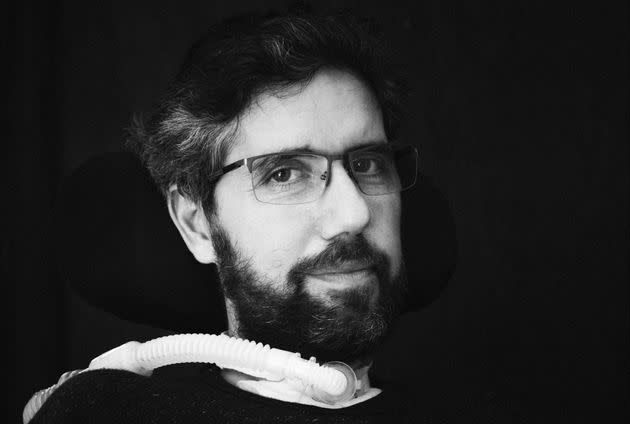
Attorney and liberal activist Ady Barkan has died.
Ady Barkan, a progressive activist and attorney who used his years-long struggle with amyotrophic lateral sclerosis to call for the protection and expansion of public health care coverage, died on Wednesday. He was 39.
Barkan’s wife, Rachael Scarborough King, announced the news on the social media platform X.
“I’m devastated to share the news that Ady has died from complications of ALS,” she wrote on Wednesday evening. “You probably knew Ady as a healthcare activist. But more importantly he was a wonderful dad and my life partner for 18 years.”
Over the course of a career cut tragically short by illness, Barkan managed to shape policy debates on workers’ rights, the Federal Reserve, the Trump tax cuts, Medicare for All and civil liberties.
Rather than retreat from public life after his October 2016 diagnosis with ALS, a fatal disease that causes paralysis, Barkan vowed to use his last breaths to leave the world better than he entered it.
“I can joke or say honestly that if I’m gonna die really young, I wanna go down swinging, in a blaze of glory,” Barkan told HuffPost in a 2017 interview.
“The hand I’ve been dealt is the shit of ALS,” he added. “But I’ve also been dealt so many incredible cards, and I think the only thing I can do is play them to the best of my ability.”
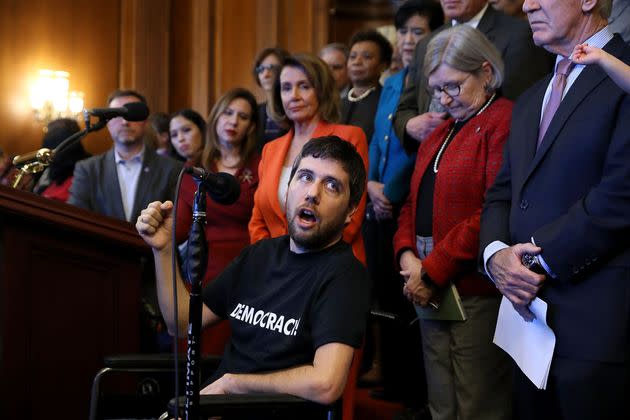
Ady Barkan (center) speaks at a 2017 rally against former President Donald Trump's tax cuts that was convened by Democratic leaders.
The progressive activism world has its fair share of megaphone-bearing march leaders, glad-handing nonprofit executives, behind-the-scenes planners, bookish experts and green visor-wearing bean counters. But the qualities that make each one of these players individually valuable are rarely concentrated in a single person.
Those who worked with Barkan before his illness brought him national renown described his unique combination of idealism and obsession with understanding the nuts and bolts of institutional power, a contagious personal energy and charisma matched with a mind for technical detail.
“He’s a pretty singular person,” said Sarah Johnson, a longtime friend of Barkan’s who worked alongside Barkan for years at Local Progress, before eventually running it herself for a time.
New York City Comptroller Brad Lander, an early partner of Barkan’s in progressive municipal politics, praised Barkan’s eclectic and complementary talents. “He’s visionary ― really smart and technical, but also funny, witty and wry ― with a sense of what makes people take notice,” said Lander, who met Barkan while he was on the New York City council.
Barkan never stopped believing that people were, at their core, reasonable, and that the obstacles to change could be removed ― or at least lowered ― by appealing to humans’ universal capacity for logic and compassion.
“He just has this intense conviction that the world is meant to be, at some fundamental level, a reasonable and just place,” said Nate Smith, Barkan’s best friend since they were high school classmates in Claremont, California.
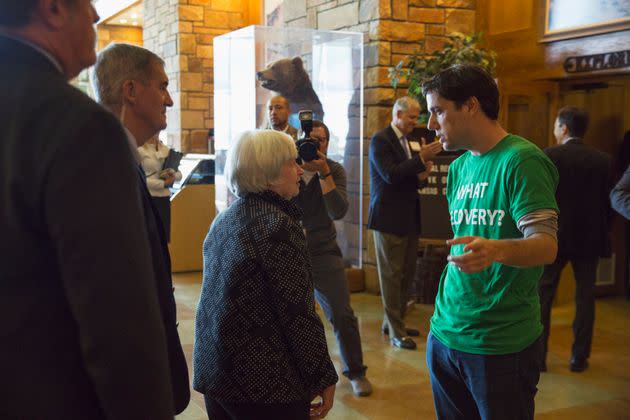
Barkan (right) speaks with then-Federal Reserve Chair Janet Yellen in Jackson Hole, Wyoming, in August 2014. Barkan pioneered a pro-worker campaign to lobby the Fed.
An Organizer With Big Ideas
By the time doctors confirmed that a bout of weakness in Barkan’s left hand was an early symptom of ALS, Barkan, then 32, had already achieved acclaim for pioneering work in the field of progressive organizing.
In 2012, two years after graduating Yale Law School, Barkan was hired at the Center for Popular Democracy, a network of low-income grassroots advocacy organizations. He became the point person for CPD’s burgeoning Local Progress initiative, which created a first-of-its-kind forum for left-leaning local elected officials from across the country.
What began as a small program with three founding city officials grew to a network of over 1,000 people across the country. Under Barkan’s leadership, the group played a pivotal role in the passage of paid sick leave in New York City in 2013 and the adoption of a $15 minimum wage in Seattle the following year.
An essay by Matt Yglesias encouraging progressives to take the effects of the Federal Reserve’s monetary policy more seriously inspired Barkan to start his own venture under CPD’s auspices.
Barkan became convinced that the Fed’s bias toward creditors over workers and borrowers was at least partly the product of an activism gap. The central bank tended to hike interest rates out of excessive vigilance against inflation ― a problem that hurts lenders’ bottom line ― but maintained a more blasé attitude about the depressing effect of those interest rate hikes on the job market.
When Barkan pitched his superiors on the idea that the CPD could transform its network of low-income worker-activists into the first-ever, progressive grassroots Federal Reserve lobbying force, they were initially skeptical.
Barkan emphasized the ways that Black and Latino workers, who suffer from significantly higher unemployment rates than white Americans, are especially vulnerable to fluctuations in the job market. But it was hard to envision teaching ordinary people enough about the Fed’s impact on their lives, let alone strategize ways to impact the notoriously secretive and elite central bank.
Ady had that instinct still that you don’t give up on the institutions ― that you can go in there and work.Nate Smith
Barkan persisted, developing a plan of action and forming the Fed Up coalition, which had its national debut at the Federal Reserve Bank of Kansas City’s annual symposium in Jackson Hole, Wyoming, in August 2014, where finance reporters were treated to the spectacle of green-shirted workers confronting senior Fed officials with their concerns.
It was all part of Barkan’s appetite for taking on unlikely fights and making his own odds with a blend of wonkish idealism and sheer determination. And it reflected an institutionalist optimism that has fallen out of fashion in some quarters of the left: a belief that even the country’s most elite institutions could be penetrated by the right social movement.
“Ady had that instinct still that you don’t give up on the institutions ― that you can go in there and work,” Smith said. “He had an ability to bridge that gap from the activist left and progressive organizers and still feel comfortable working with the institutions and people that the left broadly might feel antagonistic towards and saying, ‘No, you can go in there and talk reason to people and make them see you.’”
Sure enough, though Barkan was comfortable pursuing long-term goals without the promise of an immediate payoff, Fed Up got tangible results in relatively short order. The group would eventually secure audiences with every Fed decision maker, including then-Fed Chairwoman Janet Yellen. Fed Up’s greatest policy successes were in increasing pressure on the central bank ― and Congress ― to push the Fed in a more racially and socioeconomically diverse direction. It was in that climate that Raphael Bostic was named the first Black president of a regional Federal Reserve bank, taking the helm in Atlanta in 2017.
What had been missing from previous, expert-driven efforts to nudge the Fed in a more progressive direction was the humanizing power of a flesh-and-blood social movement. Barkan’s personality and experience equipped him to engineer the force that would fill that gap.
“Ady not only recognized a deep problem that had been around for decades, but he managed to do something about it in a way that I never imagined,” Jared Bernstein, a member of President Joe Biden’s Council of Economic Advisers, told HuffPost in 2017. “We’ve written academic papers and we’ve complained about some of the metrics they used, but he did something about it and has been way more influential than people realize.”
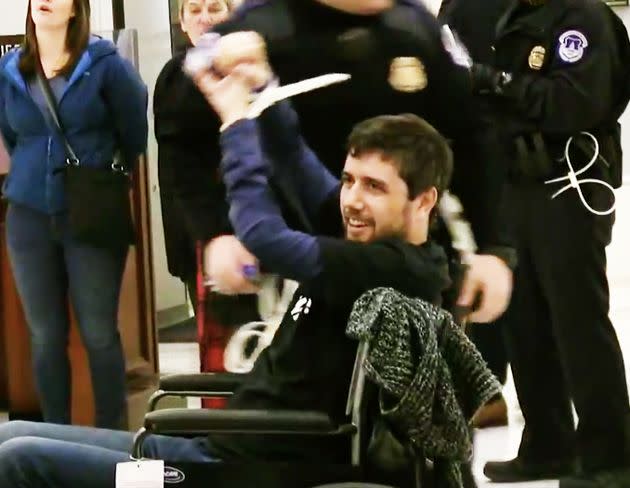
Barkan raises his fists in triumph after getting arrested while protesting Trump's tax proposals on his 34th birthday.
A Human Face On The Fallout Of Trump’s Tax Cuts
The fall of 2016 was devastating for Barkan, not only because of the ALS diagnosis he described in his 2019 memoir, “Eyes to the Wind,” as a “death sentence.” During her 2016 campaign for president, Hillary Clinton had adopted many of Fed Up’s recommended reforms, embracing a call to “get bankers off the boards of regional Federal Reserve banks.” A victory for Clinton would have meant a unique chance for Barkan and his team to mold policy; her unexpected loss was especially shattering for Barkan.
“My world had already fallen apart, and I wasn’t sure how I would tolerate this second blow,” Barkan wrote in his memoir.
After a year of reflection with family, pursuit of experimental medical treatments and continued work for Fed Up, Barkan finally developed a firmer idea of how he would respond to ALS. Hoping to use every ounce of waning strength in his body to fight the Trump administration’s policies, he traveled to Washington in December 2017 to engage in civil disobedience to protest the White House’s tax cuts. Standing outside the office of Rep. Darrell Issa, a California Republican, Barkan cast the tax cuts as a direct threat to his health and that of his family, since the budget-busting bill could trigger automatic cuts to social programs and would undoubtedly increase pressure to balance the budget on the backs of sick and vulnerable people. Refusing to move from his position obstructing the entrance, Barkan, propping himself up with a cane, was arrested for the first time in his life.
But an airplane ride back from Washington to his home in Santa Barbara, California, would prove far more influential than that first round of civil disobedience on Capitol Hill. Barkan ended up boarding a connecting flight to Phoenix on which then-Sen. Jeff Flake (R-Ariz.) was also a passenger. Barkan invited Flake to chat with him about the tax cuts during the flight and Flake obliged, leading to a civil exchange in which Barkan exposed Flake’s priorities.
“You can be an American hero,” Barkan implored Flake.
Progressive strategist Liz Jaff, who was also on the flight, filmed their exchange and posted it to Twitter, turning Barkan, and his mission to put a human face on the movement to stop the tax cuts, into an overnight sensation.
“The whole world is finally seeing this person who I’ve had this intense privilege to know and love and work with over the years,” Johnson remembered thinking, noting how it exemplified “his total wonkery and seriousness about the content, his courage, his willingness to engage in direct confrontation, but to do it actually in this way that kind of invites people in.”
Smith believes that were it not for Barkan’s moral convictions and confidence in his own reasoning power, the interaction would not have been the game-changing event that it became.
“To end up on that plane with Jeff Flake is total serendipity on the one hand, but on the other hand, Ady is the unstoppable force that met the right moment,” Smith said.
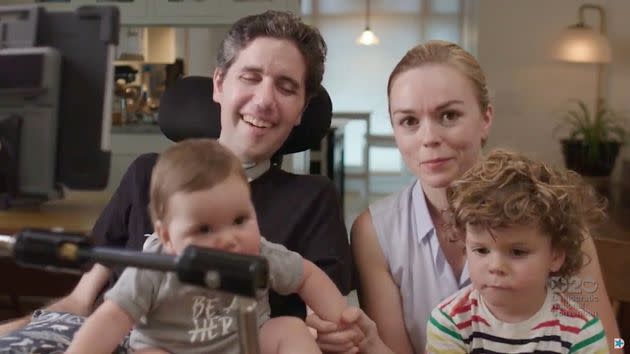
Barkan with his wife, Rachael Scarborough King, and their children, Willow (left) and Carl, in a video that aired during the Democratic National Convention in August 2020.
Leveraging His Story
Barkan returned to the Capitol several times to risk arrest while protesting the tax cuts, each time joined by a steadily larger contingent of allies. His uphill crusade to stop the tax cuts failed, but he laid the foundation for an enduring progressive political organization that put real people and their stories at the center of technical policy debates.
But Barkan was animated by more than just a commitment to use his last moments to advance the cause of justice. Even amid deep personal pain, he recognized that he was fortunate to enjoy the privilege of being white, upper-middle class and now famous in a country riven by racism and inequality.
“As an organizer, it just wasn’t his instinct to make himself part of the story,” Lander said. “Once he got there ― once he realized that it was important for him to center his own story in these fights, he became a really good organizer of his own story.”
Rather than deny himself the perks associated with his growing influence, Barkan at once took advantage of his platform to ease his personal situation and to call attention to the injustice of a system that required such privilege to obtain essential medical care. When Barkan’s insurance company initially refused to cover a breathing machine that Barkan needed to help him sleep, he shamed the company into submission with a viral tweet in January 2018.
“I’m confident [that my insurer] would not have moved so quickly if I did not have a big Twitter following,” he told HuffPost at the time. “I know millions of people are denied necessary care every year even though they are entitled to it. That’s a pretty unjust way to run a health care system.”
In April 2018, Barkan founded the Be A Hero Fund, a name inspired by his plea to Flake, to promote his political agenda, and leverage his name and story to raise money for political candidates directly. One of his first beneficiaries was Democrat Hiral Tipirneni, an Arizona doctor competing in a special election for an open House seat with limited support from the national Democratic Party.
Accompanied by a camera operator, Barkan traveled to Arizona and confronted Tipirneni’s Republican opponent, Debbie Lesko, about how Republicans planned to use the Trump tax cuts as an opportunity to cut Social Security, Medicare and Medicaid. The Be A Hero Fund followed up his headline-generating meeting with Lesko with a six-figure ad campaign framing the special election as an opportunity to protect health care from the spending cuts that the Trump tax bill was likely to unleash. Tipirneni lost by less than 5 points, but her strong performance inspired national Democrats to get behind her 2020 run in a different district.
Later that year, when Sen. Susan Collins (R-Maine) was considering whether to vote in favor of Brett Kavanaugh’s Supreme Court nomination, despite allegations that Kavanaugh had attempted to rape a woman in high school, Barkan spearheaded an effort to crowdfund money for a challenger in 2020 if Collins voted to confirm Kavanaugh. Collins voted “yes,” but thanks in part to Barkan’s work, anyone considering challenging her would have had no trouble raising campaign funds. The initiative provided Maine House Speaker Sara Gideon, Collins’ unsuccessful Democratic challenger, nearly $4 million.
The defeats that Barkan endured in so many of the high-profile battles he took on following his ALS diagnosis ― the passed tax cuts, Kavanaugh’s confirmation, Collins’ reelection ― did not dull his appetite to effect change. In that way, Barkan’s approach to politics mirrored his attitude toward the illness steadily sucking the life out of him: Even when the odds of victory were slim to none, he believed the fight itself gave him meaning and inspired those around him.
On those days when it’s hard for us to get out of bed, you just think, if Ady is organizing today, I can get up and organize today.Brad Lander
“On those days when it’s hard for us to get out of bed, you just think, if Ady is organizing today, I can get up and organize today,” Lander told HuffPost in January 2021.
Even as Barkan’s strength withered in the ensuing years ― by 2020, he was communicating through a text-to-voice computer program that tracked his eye movements ― his status as a progressive folk hero only increased.
In April 2019, Barkan testified before the first-ever congressional hearing on Medicare for All, describing how out-of-pocket health care costs of $9,000 a month had forced him to crowdfund assistance from friends, family and supporters. He recounted how he and his wife, Rachael Scarborough King, had spent hours of their remaining time together fighting with their insurer.
“Some people argue that, although Medicare for All is a great idea, we need to move slowly to get there,” he said. “But I needed Medicare for All yesterday.”
Thanks to his prominence and the respect that his work elicited, Democratic presidential candidates courted his blessing during the prolonged battle over who would take on Trump. Barkan welcomed the large field of Democratic presidential candidates to sit down with him at his home in Santa Barbara for recorded interviews that focused on their views about health care in general, and Medicare for All in particular.
Barkan’s eventual preference in the presidential primary would embody his belief in the importance of using institutional tools ― and expertise ― to enact transformative change. While Sen. Elizabeth Warren’s announcement that she would enact Medicare for All in two separate stages angered some on the left, Barkan rallied to her side at a critical moment during her ultimately unsuccessful bid, announcing his endorsement in November 2019.
“I believe that she, more than any other person in America, has the skills, the temperament, and the knowledge to lead us toward a more just and equitable future,” he wrote in The Nation.
Although then-presidential candidate Joe Biden declined to meet with Barkan during the primary, he sat for an emotional interview in July 2020. They acknowledged their disagreement on Medicare for All, but Barkan went on to endorse Biden shortly thereafter, calling on his fellow left-wing voters who preferred other candidates to do the same.
“He is everything Trump is not: compassionate, intelligent and committed to the public interest,” Barkan said in his video endorsement.
Barkan addressed a television audience of millions during the Democratic National Convention in August 2020, sharing a similar message.
“With the existential threat of another four years of this president,” Barkan said, “we all have a profound obligation to act ― not only to vote but to make sure that our friends, family and neighbors vote as well.”
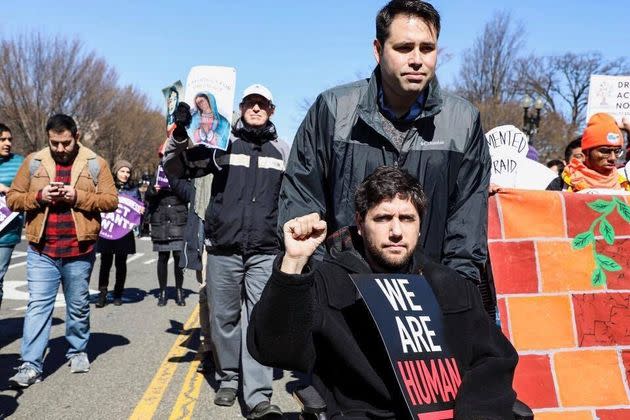
Nate Smith wheels Barkan during a progressive demonstration in Washington. Smith, a high school friend of Barkan's, recalled Barkan's stubborn commitment to justice.
‘He Can’t Let It Go’
Ohad “Ady” Barkan was born on Dec. 18, 1983. His mother, Diana Kormos-Buchwald, a Romanian Jew, met his father, Tel Aviv native Elazar Barkan, after she moved to Israel in the 1970s. The couple moved to the United States, where Ady was born, and became history professors. They divorced and both remarried while he was still a boy. In the process, Barkan got a step-brother, Zach, from his mother’s second marriage, and half-brother, Muki, from his father’s second marriage.
Barkan was raised in a secular Jewish household, but has described his appreciation of Judaism’s social-justice tradition, exemplified by the value of “tikkun olam,” or repairing the world.
As a young man growing up in Southern California, Smith saw in Barkan an early passion for correcting injustice.
“When Ady sees authority being used in ways that are cruel or unfair, he can’t let it go. He’s like a dog with a bone,” Smith said.
“The rest of us have a certain tolerance for bullshit,” he continued. “We understand that you’re going to run into some assholes and some of those assholes are going to have power over you. Most of us kind of accommodate ourselves to it in one way or another. Ady never would.”
Initially, Barkan’s indignation took the form of objecting to the way a teacher was grading exams or a coach was running a scrimmage game. Then one day, Smith saw Barkan in his car and stopped to see where he was headed.
“I was just looking for a ride home and he said, ‘Get in, we’re canvassing for gay rights,’” Smith recalled.
As a high-school student, Barkan traversed the eastern reaches of Los Angeles County seeking to drum up opposition to a March 2000 referendum that would prevent California from recognizing same-sex marriages performed in other states. The ballot measure, Prop 22, ended up passing by a wide margin, but he was ahead of the curve on an LGBTQ rights revolution that would sweep California and the rest of the country a decade later.
Barkan carried his passion for social justice to college at Columbia University, where he met his future wife ― and fellow college newspaper staffer ― Rachael. As a student, Barkan played a major role in efforts to ensure that the workers in developing countries who made the university’s branded apparel were paid a living wage and had safe working conditions.
Barkan went on to law school at Yale, fueled by the same idealism that had animated his youth. He volunteered at an immigrant worker rights legal clinic, spending countless hours interviewing restaurant workers about the wage theft they had endured and assembling a legal case to win them the money they were owed.
He also became active in a law student group pushing Western governments and pharmaceutical companies to make essential drugs, such as those used to treat HIV and AIDS, available at affordable rates in developing nations.
Those experiences by turns exhilarated and frustrated Barkan, who soon discovered both the limits of direct aid to workers of the kind offered by the clinic, and the slow pace of change sought by affordable medicine advocates.
He was always thinking outside the box.Shira Scheindlin
“Political change, I began to learn, was only achievable through sustained struggle, which required sustainable and powerful institutions that could continue pursuing their objectives for many years,” he wrote in his memoir.
Barkan’s own journey to carve out a niche in those institutions began with a year-long, post-law school fellowship at Make the Road New York, an immigrant rights organization. Barkan used his fluent Spanish and experience at the Yale clinic to represent immigrant workers who were subject to illegal exploitation.
Prior to joining the Center for Popular Democracy in 2012, Barkan spent a year clerking for federal judge Shira Scheindlin, a civil libertarian known for striking down the New York City Police Department’s “stop-and-frisk” policy in August 2013. Barkan helped draft Scheindlin’s May 2012 decision granting class-action status to the plaintiffs challenging the practice ― an early victory for civil liberties advocates on the road to a fuller vindication the following year.
“He was always thinking outside the box and seeing where we could push the envelope a little bit ― not one of those who was just tied to precedent and never thought about what we might be able to do,” Scheindlin told HuffPost in 2017.
Although the final years of Barkan’s life were consumed with serious-minded political work, Barkan never lost his dry sense of humor or stopped enjoying life’s pleasures, sharing tender moments with his children and joking about his affinity for marijuana with his legion social media followers.
Barkan is survived by his wife Rachael; son, Carl; and daughter, Willow.
He leaves behind a community of activists, organizers and lawmakers bound by the love and shared sense of purpose his life instilled in them, as well as a trove of videos, photos, essays and articles documenting his work.
Rachael hopes the abundant media cataloguing Barkan’s journey can bring his vision alive for their children after he is gone.
“One of the gifts of this moment right now is now we’re gonna have a lot of artifacts of Ady” engaged in progressive politics, she told HuffPost in 2017.
Barkan’s impact is already being commemorated in more formal ways. In 2019, Local Progress created the Ady Barkan Progressive Champion Award for outstanding work in local government.
And the progressive news outlet The Intercept crowdfunded a journalism fellowship in Barkan’s honor.
Lander told HuffPost in January 2021 that when the United States finally ensures universal health care, it will be “the biggest part of his legacy.”
But Barkan’s influence extends beyond politics. He shared the experience of dying from ALS with the world, modeling how one person can come to grips with their deadly illness. Of all the injustices that Barkan confronted, the honesty and bravery with which he greeted his own tragedy ― the painful and inexorable march of ALS ― may have been his greatest triumph.
“We’re all going to die,” Smith said. “We’re all going to follow him down that path and in some ways he’s wrestling with those questions for us.”
Catching himself, Smith paused and modified his remarks.
“He hasn’t just wrestled with it,” Smith said. “He’s in a losing battle and yet, in the face of that, to continue and make that assertion of life and to live abundantly even under that shadow — it’s powerful stuff.”

 Yahoo News
Yahoo News 